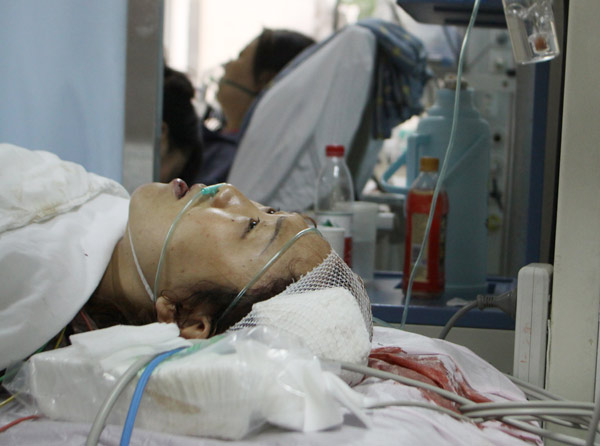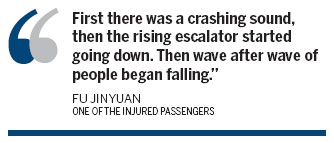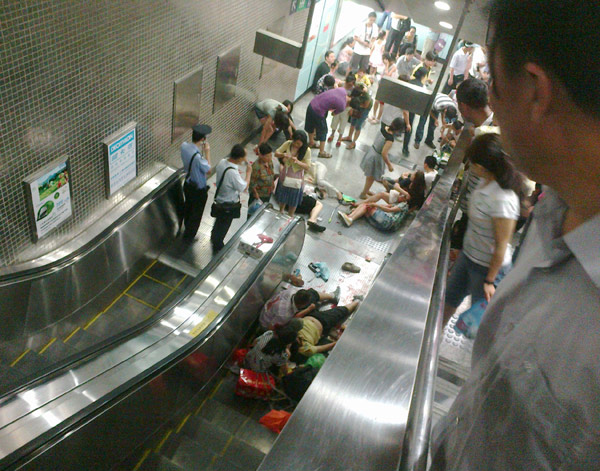Society
Subway escalator crush kills boy
By Wang Huazhong (China Daily)
Updated: 2011-07-06 07:02
 |
Large Medium Small |
BEIJING - A 13-year-old boy was killed and 30 others injured, three seriously, on Tuesday morning when a "crowded" ascending subway escalator suddenly reversed direction, a spokeswoman for the subway operator said.
|
 Song Cuiling, who received head injuries, is treated at Peking University People's Hospital. [Jing You / for China Daily] |
The accident occurred at 9:36 am on an OTIS escalator at Beijing Zoo Station Exit A on Line 4, Yang Ling, from the line's operator, Beijing MTR Corporation, said at a news conference.
The line opened in 2009.
Pictures posted online by witnesses show discarded shoes, bags, and flattened bottles scattered at the bottom of the escalator. Several people, lying or sitting on the bloodstained floor, are being helped and comforted by members of the public.

Fu Jinyuan, one of the injured, recalled the moment when the escalator malfunctioned while receiving treatment at Peking University People's Hospital.
"First there was a crashing sound, then the rising escalator started going down. Then wave after wave of people began falling. I thought I was finished."
Song Cuiling, 39, had several stitches inserted on her head and leg at the hospital's ICU.
"I heard people screaming," she said. "Then I found myself bent under people, with my head touching my ankle."
Chen Bulian, in her late 50s, sustained neck and hand injuries.
"People were screaming 'help' when the escalator begun to reverse. It was going down very, very fast," she said. "I could barely realize what was happening before I was crushed."
Survivors said those in the middle section of the escalator, immediately prior to the accident, suffered the worst injuries.
The injured said a medical team did not arrive until 20 minutes after the accident.
|
 Several injured people are comforted by passers-by after an escalator accident on Tuesday morning at Beijing Zoo Station on Line 4. The ascending escalator suddenly changed direction, causing a crush that killed a boy and injured 30. [Zhu Xingxin / for China Daily] |
The exit had two escalators, ascending and descending, and was cordoned off after the accident.
The subway operator said it immediately stopped operation of all 10 OTIS escalators on Line 4.
"OTIS technicians check the escalators every 15 days", Yang said, adding that they were last checked on June 22.
A Beijing MTR Corporation engineer, who attended the news conference, refused to say if subway escalators were subjected to higher quality standards than other escalators.
From Sept 28, 2009, when Line 4 opened, to May 2011, the line carried 400 million passengers, the operator said.
Telephone calls to OTIS went unanswered on Tuesday afternoon and the Beijing Special Equipment Inspection and Testing Center, which oversees escalator quality standards, declined China Daily's interview request.
This was not the first escalator accident in China.
On March 25, 61 children were injured when an escalator at Wuxi Zoo, in Jiangsu province, suddenly stopped.
On Dec 14, 2010, 24 passengers were injured when an escalator also reversed direction in a Shenzhen subway station in Guangdong province.
"You don't have to walk, people will push you forward" as the subways are so crowded, Yang Jingtao, a Beijing taxi driver, said.
"And there are no broadcasts to remind you to hold the rails tightly like in Hong Kong."
Wang Jingqiong contributed to this story.
| 分享按鈕 |